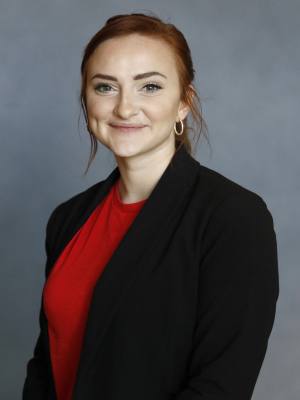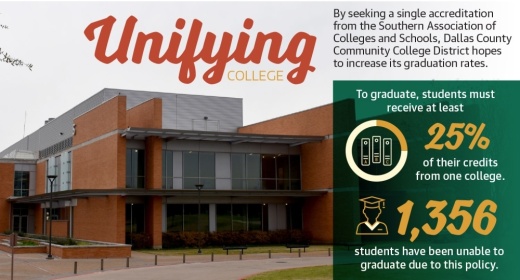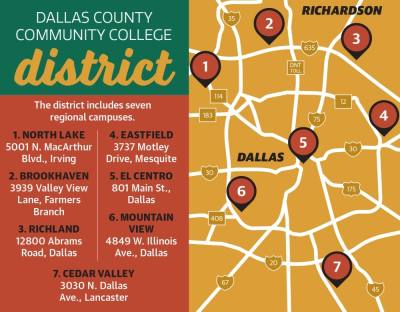The decision to seek a single accreditation for the district’s seven college is due in part to a policy administered by Southern Association of Colleges and Schools that requires students to take 25% of their credit hours at one institution. This has created issues for so-called “swirl students,” or those who take courses at more than one of the district’s seven campuses.
“About 13% of our entire student population [is swirl students],” said Kay Eggleston, president of Richland College, the DCCCD campus closest to Richardson.
Over the years, the 25% rule has rendered more than 1,300 students ineligible for graduation, according to Alex Lyda, senior managing director of communications for DCCCD.
The initiative, called One College, is intended to remedy this issue. By seeking an umbrella accreditation for all seven colleges, DCCCD expects to remedy problems for graduating students while also removing enrollment barriers for prospective students.
The effort should also serve to ease the transition for Richardson ISD students who take dual-credit courses through DCCCD or who enroll in a district college after high school.
“The One College Initiative is really a transformative approach to the next 50 years of the Dallas County Community College District,” Eggleston said.
Centralizing accreditation
The community college district was first formed in the 1960s and ‘70s with the goal of providing accessible higher education for all of Dallas County, North Lake College President Christa Slejko said.
The seven schools are governed under the same administrative body, Slejko said, so the individually accredited model did not become an issue until more students began enrolling in online courses.
“We had an ‘a-ha’ [moment] this summer when we saw that there were [about] 400 students on the books who had all their hours, but they couldn’t graduate because they had such a mix [of colleges],” Slejko said. “That was terrible and certainly never intended, but we were hamstrung.”
The solution for some students was to enroll in more courses to get at least 25% of their credits from one college, Slejko said. Over 1,300 simply chose not to graduate.
In response, DCCCD is working to receive one centralized accreditation from the Southern Association of Colleges and Schools, the body that provides accreditation to colleges and universities in Texas and other nearby states.
Hashing out the specifics
Along with seeking a singular accreditation, DCCCD will also undergo several other changes.
One major shift involves branding, Eggleston said. The DCCCD board approved the name “Dallas College” for the new, unified system in January. The Richland campus, for example, will become Dallas College at Richland.
The transition should also lend itself to a more seamless college experience for students, Eggleston said. Online classes that would not have been available at one school due to low enrollment will now be able to be combined with an online section from another school in order to meet the minimum number of students required.
Impact on RISD
One of the primary ways the district partners with DCCCD is through its dual-credit program, which provides high school students with the opportunity to earn college credits.
The number of Richardson ISD students enrolled in dual-credit courses has steadily increased in recent years, said Elizabeth Swaner, RISD executive director of college and career readiness. More than 1,100 seats in DCCCD classes are currently occupied by RISD dual-credit students, she added.
The One College initiative will also make registration easier for dual-credit students, Swaner said. Under the current system, students have to register separately at each college. RISD schools then have to send any additional paperwork to each school individually. With an umbrella accreditation, students and schools will have to complete only one set of paperwork.
RISD participates in the Dallas County Promise Program, which provides free tuition to students who pledge to attend a DCCCD college upon graduating from high school. Students in the program who complete their associate degree also have the opportunity to attend certain four-year universities for free.
RISD joined the program in school year 2018-19. At that time, only Berkner and Richardson high schools were invited to participate. Those campuses saw a 5% increase in the number of students who enrolled in college after graduation, Swaner said. This past year, the program added Lake Highlands High School.
RISD staff members who teach dual-credit courses at DCCCD colleges will also be affected by the move to a single accreditation, Swaner said.
Currently, teachers have to go through separate credentialing processes for each DCCCD school. When DCCCD receives an umbrella accreditation, teachers will be able to obtain one credential for all seven campuses in the district, which will allow them the ability to teach more courses, Swaner said.
Next steps
DCCCD plans to apply for the change with the Southern Association of Colleges and Schools in the spring, but the process will take some time.
“This is not something that will happen just overnight,” Eggleston said.
The board will review the application in June. If accepted, site visits should take place in early fall. The board is expected to vote on the change in December.







